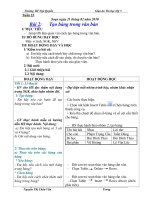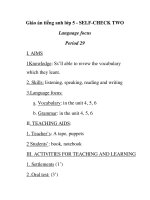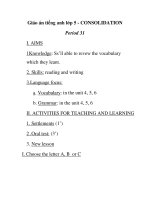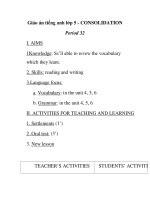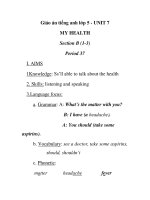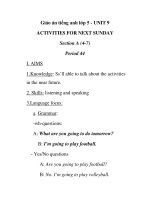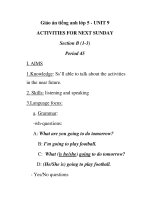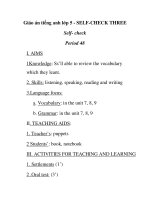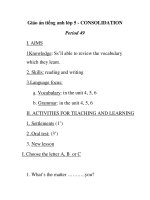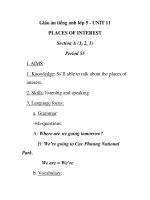- Trang chủ >>
- THPT Quốc Gia >>
- Lý
Giáo án tiếng anh lớp 5 tuần 23
Bạn đang xem bản rút gọn của tài liệu. Xem và tải ngay bản đầy đủ của tài liệu tại đây (130.82 KB, 10 trang )
<span class='text_page_counter'>(1)</span><div class='page_container' data-page=1>
<i><b>Week 23 Period 89</b></i>
<i><b>Date of preparing: 14/2/2015</b><b> </b></i>
<b>UNIT 13: ACCIDENT PREVENTION</b>
<b>LESSON 3(1-2_</b>
<b>1.Look, listen and repeat.</b>
<b>2.Point, ask and answer.</b>
<b>Objectives:</b> At the end of the period, pupils will be able to: ask and answer
questions about accident prevention.
<b>Language </b>
<b>focus:</b>
Sentence patterns:
Why shouldn’t they jump into the river?
Because they may drown.
Vocabulary : barefoot, knife, lighter, start, drown
<b>Resources:</b> Student’s book, recording, puppets, flash cards,….
<b>PROCEDURE</b>
<b>1.Warm up:</b>
<b>(3’)</b>
- Ask ss to display their word cards and use
these cards to play a game of matching.
Whole class
<b>2.Look, listen </b>
<b>and repeat.(12’)</b>
- Ask ss to open their book and observe the
pictures. Elicit their comments on the
pictures and set the content: The pupils in Mr
Loc’s class are having a lesson on “ Accident
Prevent for Children”. Read the lines in the
pictures and check ss’ comprehension.
- Teach the word: <i>drown</i> and have ss repeat it
a few times.
- Play the recording twice: once for ss to
listen all the way through and once for them
to repeat each line a few times.
- Divide the class into groups to take turns to
say the lines in the pictures.
<b>3.Point, ask and </b>
<b>answer.(13’)</b>
</div>
<span class='text_page_counter'>(2)</span><div class='page_container' data-page=2>
- Point to the pictures, read the prompts and
check ss’ comprehension. Teach the new
vocab: barefoot, knife, lighter, start. Get ss to
repeat each word a few times.
- Model the task, using the example. Repeat
the step a few times. Call on a few open pairs
to continue in the same way with all the
pictures.
- Have ss work in pairs to take turns to point,
ask and answer questions about the seasons.
Monitor the activity and offer help when
necessary.
- Select a few times to perform the task in
front of the class, using flashcards or the
pictures in the book. Praise if the pair do
well.
Notes:
a. go barefoot/ get a bad cut
b. play with a lighter/ start a room fire.
c. play with the cat, scratch his face
d. play with the knife, get a cut.
<b>4.Reinforcement</b>
<b>(5’)</b>
Pairwork
<b>5.Homelink:</b>
<b>(2’)</b>
Individually
<b>---Week 23 Period 90</b>
<b>Date of preparing: 15/2/2015 </b>
<b>UNIT 13: ACCIDENT PREVENTION</b>
<b>LESSON 3(3-4)</b>
<b>1.Read and do the tasks.</b>
<b>2.Write about your favourite book.</b>
<b>3. Fun time </b>
<b>Objectives:</b> At the end of the period, pupils will be able to: read an informative
text on fall prevention for yougher children and write a message.
<b>Language </b>
<b>focus:</b>
Sentence pattems:
</div>
<span class='text_page_counter'>(3)</span><div class='page_container' data-page=3>
Because they may drown.
Vocabulary : roll off, a cradle, a car seat carrier, crawl up or down
<b>Resources:</b> Student’s book, recording, puppets, flash cards,….
<b>PROCEDURE</b>
<b>1.Warm up:</b>
<b>(3’)</b>
Play a game : Guessing Game Whole class
<b>2.Read the </b>
<b>passage and do </b>
<b>the task.(12’)</b>
* Task a:
- Ask ss to open the book on page 25,
observe the picture and read the texts. Elicit
ss’ comments on the picture and set the
context: You are going to read a passage
about common accidents which may happen
to young children.
- Teach the vocab: <i>roll off, a cradle, a car </i>
<i>seat carrier, crawl up or down.</i>
Write the words on the board and get ss to
repeat them a few times.
- Check if ss understand the passage and
Task a: They should skim the passage to get
the general idea to select the suitable title.
- Set the time. SS do the task independetly.
Monitor the activity and offer help as
necessary.
- Have ss check their answers in pairs before
calling some individually ss to say the
answers to the class. Ask ss to explain how to
get to their answer.
<b>Asnwer: </b>
<b> B</b>
* Task b:
- Get ss to read the words in focus. Check
their comprehension and tell them about the
task: They are to scan the passage quickly to
find the words which have the meaning
given.
- Set the time. Monitor the activity and offer
help as necessary.
</div>
<span class='text_page_counter'>(4)</span><div class='page_container' data-page=4>
<b>Answers: </b>
<i>1. crawl 2. serious 3. most common</i>
<i>4. make sure</i>
* Task c:
- Get ss to read the questions in task c
carefully. Then they scan the passage to find
the appropriate information to answer the
questions.
- Set the time and let ss do the task
independently. Call on a few ss to report the
answers to the class. If there is any
disagreement, get ss to read the text related to
the answer again.
<b>Answers:</b>
<i>1. Accidents can happen to babies anywhere </i>
<i>in the home.</i>
<i>2. Fall is the most common type of a accident</i>
<i>to babies.</i>
<i>3. The biggest danger for babies is falling </i>
<i>down the balcony, the stairs or out of a </i>
<i>window.</i>
<b>3.Write(13’)</b> - Get ss to open their books on page 26 and
read the guiding questions. Check their
comprehension and show them how to do the
task: They should finish the writing frame
relying on the dialogues in Lesson 1. Remind
ss of drafting before copying onto their copy
books.
- If there is not enough class time, turn it into
a home link activity: SS do their writing at
home and copy it onto a clean sheet of paper
for a class display in the next lesson.
<b>Suggested answer: </b>
<i>Dear Jim, </i>
<i>You always ride your bike too fast. You </i>
<i>should not do that because you may fall off </i>
<i>your bike.</i>
</div>
<span class='text_page_counter'>(5)</span><div class='page_container' data-page=5>
<b>* Fun time</b>
<i>ground. You are my best friend and I want </i>
<i>you to avoid serious accidents.</i>
<i>Linda.</i>
Do the crossword puzzle:
- Ask ss to open their book on page 26. Stick
the large sized sheet of paper with the
crossword puzzle written on it on the board.
Discuss the pictures with ss and elicit their
suggestions for the words in the grid.
- Set the time and let ss play the game
independently or in pairs. Monitor the
activity and offer help as necessary.
<b>4.Reinforcement</b>
<b>(5’)</b>
- Ss play the game The Spelling Bee to spell
all the words in the grid of the crossword
puzzle.
Pair work
<b>5.Homelink:</b>
<b>(2’)</b>
- Ask ss to do their writing task at home for
the class display in the next lesson.
Individually
<b>---Week 23 Period 91 </b>
<b>Date of preparing : 17/2 /2015 </b>
<b>UNIT 14: My Favourite Stories</b>
<b>LESSON 1(1-2)</b>
<b>1.Look, listen and repeat.</b>
<b>2.Point, ask and asnwer.</b>
<b>Objectives:</b> By the end of the lesson ss will be able to ask and answer questions
about the main events in a story.
<b>Language </b>
<b>focus:</b>
Sentence patterns:
What happened first ?
- The fox asked : “ Will you give me some meat ? ”
What happened finally ?
- The fox said: “ Yummy, yummy !”
Vocabulary : fox, crow, cowshed, beak, shake, yummy, forest, hare,
</div>
<span class='text_page_counter'>(6)</span><div class='page_container' data-page=6>
<b>Resources:</b> Student’s book, recording, puppets, flash cards, CD, Student’s Book
English 5, Unit 14, P.27-33
<b>PROCEDURE</b>
<b>1.Warm up:</b>
<b>(3’)</b>
- Ask ss play <i>the game Flap that Word, </i>using words
for the animals they have learnt such as: dog, cat,
mouse, tiger and lion.
- Whole
class
<b>2.Look, listen</b>
<b>and repeat(12’)</b>
- Ask ss to open their book on Page 27. Tell them to
read the title of the story and observe the pictures.
Get pupils to identify the character animals in the
pictures and discuss what is happening in each
picture. Set the context: You are going to read a
story between a clever fox and a crow. Recall the
familiar vocabulary and pre-teach the new words:
<i>Crow, fox, piece of meat, beak, dropped, picked up.</i>
- Write the words on the board and get ss to repeat
each of them a few times.
- Make sure that ss can understand the situation and
the language in this section. Read the lines each
picture, pausing at times to check ss’
comprehension.
- Play the recording twice : once for ss to listen all
the way through and once for them to repeat. Pause
after each line for ss to repeat.
- Make sure that pupils understand the situation and
the language.
Whole class
T- WC/
Individually
/
Pair work/
Group work
T- SS
Individually
<b>3.Point, ask and</b>
<b>answer.(13’)</b>
- Get pupils to read the chart and the examples.
Elicit their prompts to complete the speech bubbles.
- Write the question and the answer on the board.
Get ss to repeat each sentence a few times.
- Model the task with the whole class.
- Ask ss to take turns to point, ask and answer
questions about their favorite subjects, using the
pictures in this section or real books. Monitor the
activity and offer help as necessary.
- Select some pairs to demonstrate this task in front
of the class. Praise the pair if the ss have a good
performance of pronunciation or language usage.
“ asked” is used with a question.
Whole class
Teacher
T- WC
Pair work
</div>
<span class='text_page_counter'>(7)</span><div class='page_container' data-page=7>
The fox asked, “ Will you give me some meat ?”
“ said” is used with a statement.
The fox said, “ Ha ha ! Thanks for the meat !”
- Remind pupils of the punctuation in the sentences.
Pair work
<b>4.Reinforcement</b>
<b>(5’)</b>
Have ss play a game: Musical box Pairwork
<b>5.Homelink:</b>
<b>(2’)</b>
Individually
<b>---Week 23 Period 92</b>
<i><b>Date of preparing:</b><b> </b><b><sub>18/2/2015</sub></b></i>
<b>UNIT 14: My Favourite Stories</b>
<b>LESSON 1 (3-4)</b>
<b> 3.Listen and tick.</b>
<b> 4.Talk.</b>
<b>Objectives:</b> By the end of the lesson ss will be able to ask and answer
questions about the main events in a story. Listen and tick the
pictures
<b>Language</b>
<b>focus:</b>
Sentence patterns:
What happened first / next / then/ finally ?
- The fox asked : “ Will you give me some meat ? ”
What happened finally ?
- The fox said: “ Yummy, yummy !”
Vocabulary : fox, crow, cowshed, beak, shake, yummy, forest,
hare, tortoise<b>:</b>.
<b>Resources:</b> Student’s book, recording, puppets, flash cards, CD, Student’s
Book English 5, Unit 14, P.27-33
<b>PROCEDURE</b>
<b>1.Warm up:</b>
<b>(3’)</b>
- Ask ss play <i>the game Flap that Word, </i>using words
for the animals they have learnt such as: dog, cat,
mouse, tiger and lion.
Whole
class
<b>2.Listen and tick.</b>
<b>(12’)</b>
- Ask Ss to open their book on page 28. Draw their
attention to the pictures in each number. Then point
to each picture to elicit ss’ responses to the
information indicated by the picture.
</div>
<span class='text_page_counter'>(8)</span><div class='page_container' data-page=8>
- Explain the listening purpose: <i>You are going to</i>
<i>listen to four dialogues in which two pupils are</i>
<i>talking about an animals story. Tick the appropriate</i>
<i>pictures as you listen. Point to each picture and elicit</i>
<i>pupils’ comments. </i>
- Pre teach the key listening words: Use Vietnamese
as necessary to help ss understand the meanings of
the words. Write the words on the board and get ss to
repeat each of them a few times. Do the first example
with the whole class.
- Play the recording or read twice: once for pupils to
listen all the way through and once for them to do the
task. Pausing after each part for ss to have sufficient
time to select and tick the box.
- Replay the recording for ss to check answer.
- Ask ss to check their answers in pairs. Then call on
a few ss to report the answers to the class. In case
there is disagreement on any answer, play the
recording related to the answer again for a correct
decision.
<b>Answers:</b>
1. b 2. c 3. a 4. b
<b>Tapecripts: </b>Voice: You are going to four dialogues
in which two pupils are talking about an animal story.
1.
<i>Girl:Do you like stories ?..</i>
<i>Boy: Yes, I do.</i>
<i>Girl:What kind of stories do you like?</i>
<i>Boy: Animal stories. What aboutyou ?</i>
<i>Girl: Animal stories too.</i>
2.
<i>Boy: Which animal story do you like best ?</i>
<i>Girl: The clever Fox and the Crow.</i>
<i>Boy: Why do you like it ?</i>
<i>Girl: Because I can learn a lesson from it/</i>
3.
<i>Girl:Do you know the story The clever Fox and the</i>
<i>Crow?</i>
<i>Boy:No. Do you ?</i>
Teacher
T- WC/
Individu
ally/
Pair
work/
Group
work
Individu
ally
</div>
<span class='text_page_counter'>(9)</span><div class='page_container' data-page=9>
<i>Girl: Yes.</i>
<i>Boy: Can you tell the story ?</i>
<i>Girl: Sure. It was a winter day. There was a crow on</i>
<i>a cowshed with a piece of meat in its beak. A hungry</i>
<i>fox, standing on the ground, asked the crow to give it</i>
<i>some meat. But the crow refused..</i>
4.
<i>Boy: What happened finally ?</i>
<i>Girl: The fox was very clever. It asked the crow to</i>
<i>sing and the crow dropped the meat on the</i>
<i>ground…...</i>
<i>Boy: Ha, ha, ha. The fox was very clever.</i>
<i>Girl:Year, that’s right.</i>
<b>3.Talk.(13’)</b> - Draw ss’ attention to all the textbook covers on this
page 28.Say: <i>You are going to read the first part of</i>
<i>the story Little Rad Riding Hood. Then observe the</i>
<i>pictures and tell the rest of the story. Read the fisrt</i>
<i>part of the story. Stop at times to check pupils’</i>
<i>comprehension. Teach the new vocabulary: Little</i>
<i>Red Riding Hood, in the other end of the village.</i>
<i>Then get pupils to repeat each sentence a few times.</i>
<i>Check if pupils know the story. If they do not, tell the</i>
<i>story, using a mixture of English and Vietnamese to</i>
<i>help pupils understand the story.</i>
- Model the activity with the whole class to give
pupils a clear idea of the activity. Call on a ss and
ask.
T: What story is it<i> ?</i>
SS:<i>Little Riding Hood.</i>
<i>T: What happened in this picture ?</i>
<i>SS: Little Riding Hoodmay a wolf in he forest.</i>
<i>T: Very good. On the way to her grandmother’s</i>
<i>cottage Little Red Riding Hood met a wolf in the</i>
<i>forest. She told it about her trip.</i>
<i>(Then get pupils to repeat each sentence related to</i>
<i>the picture a few times. )</i>
a. On the way to her grandmother’s cottage, Little
Whole
class
T- SS
Pairwork
</div>
<span class='text_page_counter'>(10)</span><div class='page_container' data-page=10>
Red Riding Hood met a wolf. She told it about her
trip.
b. The wolf ran very fast to the grandmother’s
cottage.
c. It swallowed the grandmother. Then it lay in the
bed to pretend Little Red Riding Hood’s
grandmother
d. Little Red Riding Hood came to see her
grandmother in the bed. The wolf talked to her. Then
it jumped out of the bed to swalled her.
e. Luckily, A hunter came. He killed the wolf, and
saved Little Red Riding Hood and ger grandmother.
- Ask ss to take turns to tell the rest of the story, using
the pictures provided. Monitor the activity and offer
help as necessary.
- Select a pair to role- play in front of the class. Praise
them for their good performance of pronunciation and
language usage.
<b>4.Reinforcement</b>
<b>(5’)</b>
- Have ss play a game: Whisper Pair
work
<b>5.Homelink:</b>
<b>(2’)</b>
- Pupils select the cover of their favorite story, copy
and color it for the class display in the next lesson.
They also prepare answers to possible questions
about their favorite story.
</div>
<!--links-->
